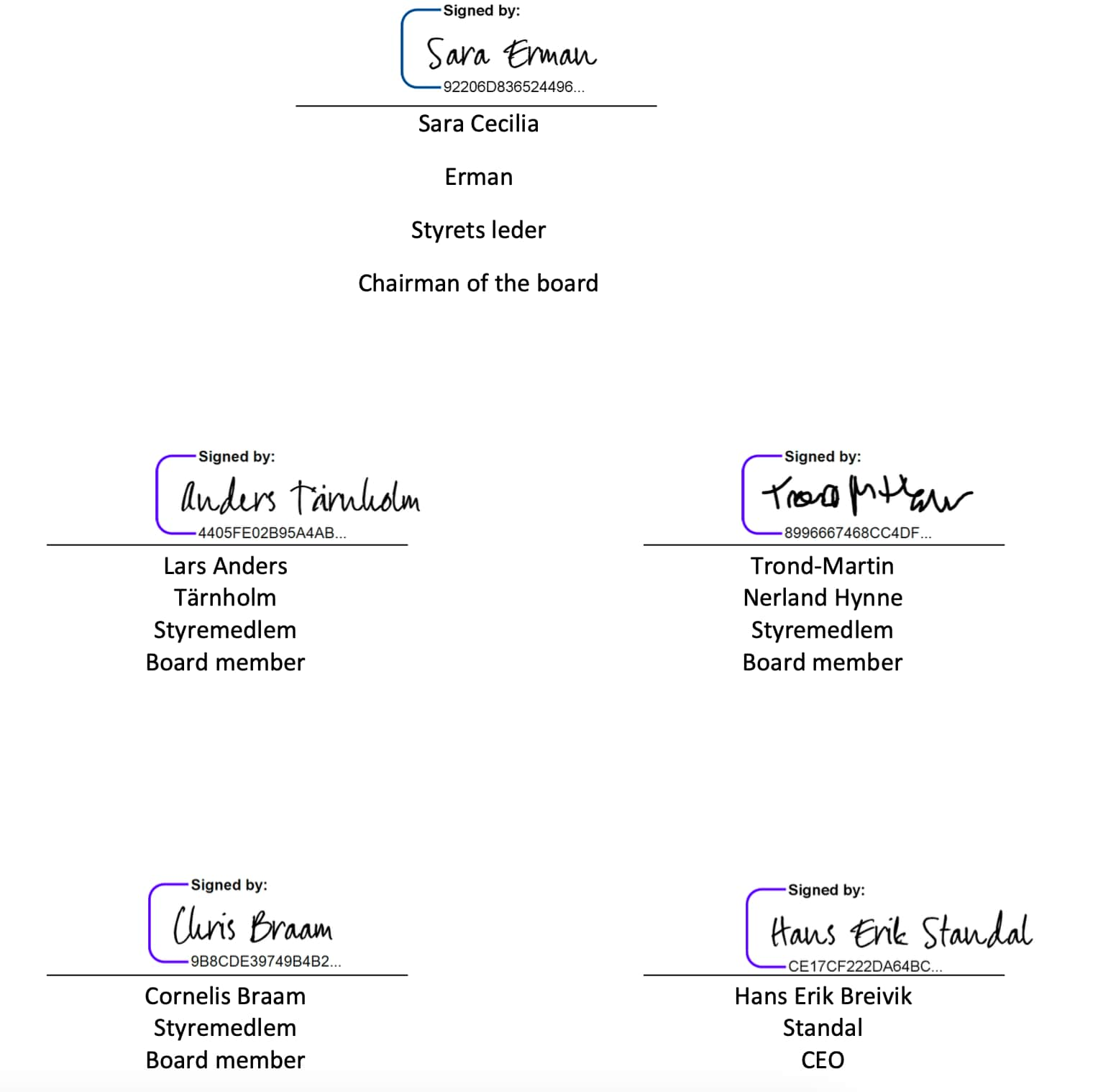
Åpenhetsloven
Statement in accordance with the Norwegian Transparency Act
Electrolux Home Products Norway AS (the “Company”) is a company within the Electrolux Group. AB Electrolux, the parent company of the Group, is a Swedish multinational home appliance manufacturer, headquartered in Stockholm and listed on Nasdaq Stockholm.
The Norwegian Transparency Act is modeled on the OECD Guidelines for Multinational Enterprises. As a leading global appliance company, Electrolux carry out due diligence pursuant to the OECD guidelines. Electrolux treats social responsibility issues with the utmost care by assessing and monitoring the business impact on social, labor and human rights in accordance with the OECD guidelines, and by taking accountability for the impact Electrolux business operations have on society, directly or indirectly through business partners.
This statement applies to 2024 and has been approved and signed by all board members and the managing director.
About the Electrolux Group
The Electrolux Group is a global leader in home appliances, offering solutions for households including products such as refrigerators, dishwashers, washing machines, cookers, vacuum cleaners, air conditioners and small domestic appliances.
The Group has 40 factories on all continents and sells approximately 60 million household products to consumers in around 120 markets every year, under brands including Electrolux, AEG and Frigidaire.
In 2024, Electrolux had sales of SEK 136bn and employed approximately 41,000 people around the world.
Governance
The Group’s Code of Conduct contains Electrolux’s Human Rights policy statement, and key principles in areas such as labor standards. The Workplace Policy and sets out provisions for labor standards in our own operations, and the same requirements are reflected in the Electrolux Supplier Workplace Standard, which applies to our suppliers. The Workplace Directive contains the detailed mandatory requirements which apply to our own operations as well as our supplier’s.
In 2019, Electrolux formed the Group’s Sustainability Board led by the CEO, tasked with assessing priorities, monitoring progress and evaluating risks. The board proposes actions and targets to Group Management and is essential in delivering on Electrolux sustainability goals, objectives and targets.
Regular education and communication on the Code of Conduct and key Group Policies is in place. All office-based staff must acknowledge the Code of Conduct by electronic signature.
A number of Group functions are accountable for identifying and managing non-financial risks in their area of responsibility. Risks are reported to Group Management and fed into the materiality process.
Key sustainability governance responsibilities:
• The Board of Directors is responsible for identifying how sustainability issues impact risks to and business opportunities for Electrolux.
• Electrolux Group Management makes decisions about sustainability priorities and monitor progress.
• Group Internal Audit evaluates and improves governance, internal control and risk management processes.
• Group Risk Management supports the business to identify and assess key risks in operations and critical suppliers, and supports the process to identify and assess Salient Human Rights Issues.
• Group Compliance is responsible for implementing an anticorruption program.
• Sourcing Boards are responsible for evaluating and approving compliant suppliers, with the support of the Responsible Sourcing team.
• Group Sustainability assesses materiality, develops policies, targets, monitors the implementation of programs. This includes regular assessment of Salient Human Rights Issues, and management of the Responsible Sourcing Program.
• The Ethics Helpline (whistleblower function) and programs for ethics and human rights are overseen by the Ethics & Human Rights Steering Group.
Oversight of ethics and human rights lies with the Ethics & Human Rights Steering Group, which comprises of senior management representatives from Group functions, including Sustainability, Legal, Human Resources & Communications, and Internal Audit.
Line managers, from Group management and down, are responsible for ensuring adherence with Group policies on human rights as part of our human rights governance structure.
All employees are required to do the Code of Conduct and Workplace Policy e-learning as part of onboarding and recurring campaigns. These inform employees of their rights as well as duties. We do targeted trainings for suppliers on these topics as well.
Management
Electrolux monitors performance and manages risks through internal and external audits, for manufacturing units, local human rights assessments, education, the Ethics Helpline, management-labor dialogue, as well as health and safety committees. Risks in the supply chain are addressed through audits and training efforts as part of the Responsible Sourcing Program and the Conflict Minerals program. Human rights procedures engage many functions throughout the organization, from Human Resources to Purchasing and Group Operations. Electrolux conducts human rights impact assessments at both Group and local level, in line with the UN Guiding Principles on Business and Human Rights, and the OECD Guidelines for Multinational Enterprises. The methodology for the assessments focuses on identifying the risk of harming people, as a direct or indirect result of Electrolux operations.
The Electrolux Group Salient Human Rights Issues include freedom of association, discrimination, working conditions, corruption, and supply chain risks such as occupational safety, forced labor and child labor.
Action plans are established to remediate impacts and risks identified in the local assessments, as well as to address the Salient Human Rights Issues.
Electrolux continuously works to monitor business operations and the impact these have on social, labor and fundamental human rights, by identifying high risk operations and production countries through risk analysis.
The entire Electrolux Group and its direct suppliers are subject to the evaluation and procedures described, including Electrolux Home Products Norway AS.
More information on the assessment of Electrolux social, labor and human rights impacts throughout the value chain can be found on pp. 42-46, 57-60 , 61-65 and 88-100 in the Annual Report 2024 under the Sustainability Reporting section available here.
Additional information is also presented in the Conflict Minerals Report 2024, the Electrolux Group statement on slavery and human trafficking 2024, and on the Group’s website www.electroluxgroup.com.
As for our operations in Norway through, we continuously conduct due diligence assessments of our suppliers and business partners. We have not identified any violations of human rights or decent working conditions during the reporting year in Norway, nor has the company identified any significant risk of such violations. We have therefore also not taken any measures in 2024, other than following up relevant suppliers.¨
Signatures
